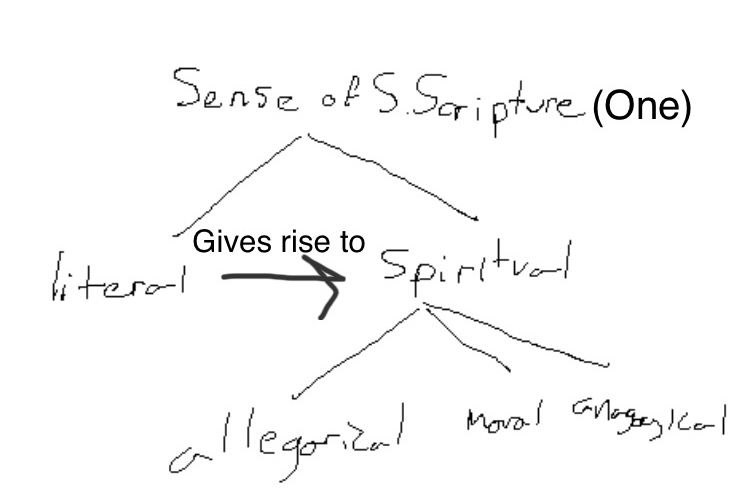Notes on the Thomist view of the sense(s) of Scripture
- brandon corley
- Mar 15, 2024
- 4 min read
Updated: Feb 7
These are notes I have collected from discussions on the Davenant discord channel from conversations mainly with Matt Peterson and Ryan Hurd. I think the Thomist position as I will present it may ultimately be reconciled with Reformed concerns, but I recognize that this requires a change in the use of terminology and also would invalidate much Reformed argumentation when they touched on this point. Nevertheless, I have been told that Samuel Rutherford’s position in his Dictates on Scripture which will be translated soon, and I have noticed certain statements from Junius that seem to assume and necessitate something like this position. I have also been told that Johannes Andreas Quenstedt was good here. In their defense, there has always been much confusion and divergent use of terminology here even down to present day. Furthermore, what matters most in the area of hermeneutics is not so much theory, but practice. I have read great accounts of hermeneutics applied in terrible ways and I have read terrible accounts of it applied in excellent ways. What mattered most to the Reformed here was guarding against terrible and Papist interpretation of Scripture.
All Scripture has one sense that at times may be twofold (encompassing both literal and spiritual sense).
The literal sense is whatever is signified by the letter of Scripture, and the spiritual sense obtains if that which is signified by the letter also, by the providence of God in history, is intended to signify something else. Thus it should be noted that the spiritual sense only arises from actual historical realities and not from metaphors.
The literal sense consists of proper and improper. Proper is what most people think of as strictly “literal” and thus usually it tells us of historical events or plain statements of fact. Improper is what most people think of as “figurative” and here belong metaphors, parables, symbols and the like.
It is held that there may be multiple literal senses in one passage. It must be remembered that: 1) the whole sense of a passage is still one. The "senses" of Scripture are formally distinct from each other and from the single "sense" of Scripture. In this way, it is analogous to the distinction between the soul (the one sense) and its powers (the 4 "senses"). 2) what is meant here is that sometimes a certain equivocation may be used that admits of different senses which nevertheless may be understood out of the same place. So Domingo Banez gives the example that:
In the beginning God created the heavens and earth." One literal sense of this is "In the beginning, that is, in the beginning of time." Another sense is in the beginning, that is, before he made anything. From the first sense, the error of those who say the world was from eternity is conquered. From the second sense, the error of the Greeks asserting that angels were created before the bodily world, is refuted.
Thus insofar as multiple concepts may be signified to us, it is said that there are multiple literal senses. To dispute this, it seems to me, would mostly be a matter of terminology.
The spiritual sense consists of allegory, anagogy, and tropology. These are held to correspond to the theological virtues of faith, hope, and love respectively as they deal with things to be believed, hoped for, and done. This is why the threefold division is held to be an adequate one. There may be multiple pulled from a single passage (thus the snake lifted up in the wilderness could be said to signify Christ in allegory, salvation in anagogy, and call us to repentance in tropology).
Notes on specific examples:
Revelation 22:1 as relating to the filioque and Proverbs 8 as relating to eternal generation are not actually dealing with spiritual sense since there are no historical realities which signify other things there (the water of life and Lady Wisdom are metaphors). They therefore include these concepts in the improper literal sense considered from a Divine-canonical perspective.
If anything is found in the Pslams which do not appear to have a literal sense of David, they either 1) speak directly of Christ in the literal sense, and hence, Junius reasoning about Psalm 2 says that “not all the things which are said in this psalm can apply to David simply and hence either the prophecy is false or the interpretation is false” or it is that 2) they speak improperly of some reality that actually occurred in David’s life which itself signifies something of Christ through the spiritual sense. Or perhaps there is a more complex way I have not thought of. Perhaps aspects of both ways obtain in the verse. And 3) double-literal sense may help us here too.
Also note that insofar as different concepts of Sonship may be discerned in Psalm 2, we may speak of multiple literal senses regarding Christ’s eternal generation, resurrection, ascension, etc. Or if taking the second way (which seems more accurate to me in this particular instance), it seems it would be multiple ways the spiritual sense may be understood. Or maybe even better, a double literal sense one of Christ the other of David.
Because the 4 senses of Scripture are only formally distinct there is no contradiction in affirming the fourfold sense while at the same time affirming that the sense of Scripture is one and not multiple since a formal distinction does not result in numerical multiplication.


Comments